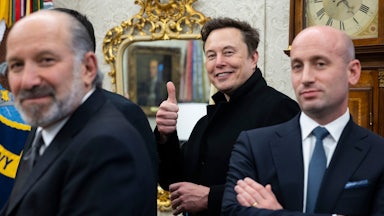As the country focused last week on the leaked draft of the Supreme Court’s expected decision to overturn Roe v. Wade, the Senate pushed through language to divert $8 billion in climate aid for the global south to defense technologies instead. Slate’s Jon Skolnick reported that Joe Manchin was the lone Democrat to join Republicans in voting for the nonbinding amendment, part of the U.S. Innovation and Competition Act being spearheaded by Senator Majority Chuck Schumer as a means to make the U.S. more competitive with China. Several more Democrats joined onto another nonbinding amendment to the same bill that would set a floor on the number of permits the U.S. issues for oil and gas drilling. On that measure Manchin joined fellow Democrats Kyrsten Sinema, John Hickenlooper, and Mark Kelly.
The U.S. Innovation and Competition Act and its companion in the House, the America COMPETES Act, have been hailed as a rare moment of bipartisan cooperation. But they’re rapidly becoming a cautionary tale—and not only because of the $8 billion taken from the Green Climate Fund—the U.N. body tasked with financing climate mitigation projects in the global south—and redistributed to the Defense Advanced Research Projects Agency, or DARPA. The Innovation and Competition Act has become a showcase of just how little Democrats stand to gain, for the climate and otherwise, from playing on Republicans’ terms when it comes to foreign policy.
Among other questionable items, the bill includes a $10 billion giveaway for a lunar landing program, money likely to land at Jeff Bezos’s company Blue Origins. As Julia Rock and Andrew Perez noted for the Lever, there’s also a $125 billion tax break for corporate R&D, passed with 90 votes in the same rapid-fire round of voting as the drilling-permit floor and diverted DARPA funding.
There are good things in the bill too. The Senate bill would put $17 billion into the Department of Energy’s research labs, and the House bill would double the budget of the National Science Foundation over the next five years, bringing it up to $18 billion. Yet in reconciling the House and Senate bills, Republicans are eager to strip any measures that might be interpreted as climate policy, while grafting on additional support for fossil fuels.
The question worth asking, at this point, is what Democrats are actually getting from their strategy of focusing on competitiveness with China. So far, not much. As Tobita Chow, director of the nonprofit organizing group Justice Is Global, argued recently in The American Prospect, shepherding progressive priorities under an anti-China banner doesn’t just stoke already rising anti-Asian racism but is very likely a losing strategy for Democrats too. Positioning all research and economic spending as a defense investment means carrying out a debate about the state of the economy on the GOP’s own terms. Chow points out that—for Republicans—scapegoating China is seen as a means to woo working-class voters while taking care not to criticize their own corporate donors, who have financed their decades-long quest to dismantle union power, wages, and welfare benefits.
“Democrats can counter this strategy,” Chow writes, “by bringing the conversation back to the pro-worker policies that have become part of the mainstream Democratic agenda under Biden, and by demonstrating solidarity with the inspiring worker organizing at corporate giants like Amazon, Starbucks, and Apple. From this position, they can go on offense against Republican opponents and expose their anti-worker, pro-corporate agenda.”
The current Democratic strategy, by contrast, seems likely among other things to further hamper climate goals. As the administration focuses on reviving domestic manufacturing, it’s taken a step away from decades of bipartisan dogma about free markets and globalization. In the process, Team Biden has carved out a line on China that’s not altogether dissimilar from Trump’s, positioning manufacturing and industrial innovation as a zero-sum contest. The key difference is this White House’s focus on recruiting allies to the cause, attempting to divide the world into democracies and autocracies via flashy summits, alliances, and more substantive trade protections and agreements. Accordingly, back in February, Biden opted to extend tariffs on imported solar panels put in place by the Trump administration, while easing some of the restrictions his predecessor put in place. (Tariffs on Chinese solar imports—expanded by Trump—were initially put in place by the Obama administration in 2012.)
The decision to stay that course is now having unintended consequences. Also in February, the tiny California firm Auxin Solar petitioned the Commerce Department to investigate whether four Southeast Asian countries, which provide 82 percent of the country’s most popular type of solar modules, are allowing Chinese manufacturers to bypass tariffs. The resulting investigation has reportedly slowed solar rollouts, according to not just the industry itself but also Energy Secretary Jennifer Granholm, who recently told the Senate Energy and Natural Resources Committee that the obsessive focus on this issue risks “the complete smothering” of green energy investment and job generation. As a result of the investigation, Commerce could implement retroactive tariffs that would “exceed 50 percent of the price of panels,” The Washington Post reports. Whatever the impact of the investigation—which is being spearheaded by career Commerce staff—utilities are already using it as an excuse to keep fossil fuels online.
It’s understandable, given the abject failure of Biden’s original Build Back Better plan and the sorry prospects for its remaining climate measures, that Democrats are looking into creative ways to invest in clean energy. And wanting to support domestic clean energy production isn’t a bad goal. But there’s no cheat code that will allow Democrats to sneak climate policy past Republicans. The White House still has plenty of tools at its disposal to speed the energy transition and burnish its reputation on the world stage, though. Biden could use the Defense Production Act to spur on clean energy production domestically. The White House could also move to redistribute the $158 billion worth of Special Drawing Rights—a basket reserve currency distributed by the International Monetary Fund—currently sitting on U.S. books, funds that could be used to support pandemic recovery and climate efforts in poorer countries, many of which face mounting economic crises. Pursuing a patchwork of corporate subsidies and punitive trade protections isn’t the answer, though.












